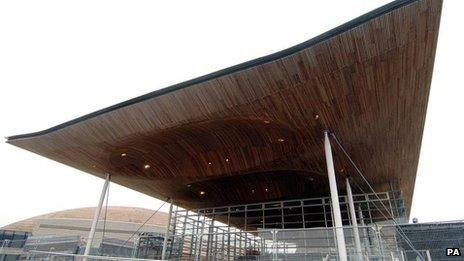BBC Wales poll: Voters back tax power, but not independence
- Published

Nearly two in three said some tax powers should be devolved to the Welsh assembly
Wales cannot take on powers over income tax until an annual £300m underfunding by Westminster is addressed, says First Minister Carwyn Jones.
His comments come as a poll for BBC Wales found almost two-thirds of voters think the Welsh assembly should have at least some influence over taxes.
Only about one in three wanted to keep the current system where the assembly has no power to vary taxes.
Support for Welsh independence remains weak, with 7% backing it.
This would rise to 12% if Scotland leaves the UK, according to the research.
The poll also shows strong support for the Welsh government's public sector-only approach to the NHS.
Pollsters ICM found 28% of people thought the assembly should have the power to reduce or increase all taxes.
A total of 36% said some tax-varying powers should be devolved within limits agreed with the UK government.
But 32% thought the assembly should have no powers over taxes.
'Transfer power'
The institution gained primary law-making powers in a referendum last year, but has no say over taxation.
Acommission into the future of devolution, externalis examining whether more financial powers, including over some taxes, should be devolved to Cardiff.
The poll found 29% were satisfied with the powers the assembly has, while 36% said it should be more powerful.
A fifth (22%) thought the assembly should be abolished.
Seven per cent thought Wales should be an independent country, rising to 12% if Scotland votes for independence.
Mr Jones told Radio Wales the assembly has "substantial" new powers following the referendum but the poll showed that there were "still areas that need to be looked at in order to see that the devolution settlement works well".
He said the Welsh government's lack of control over energy policy meant Wales was "losing out big time in terms of jobs creation" in the sector.
He said there were some areas of tax, such as landfill tax, the aggregates levy, housing stamp duty and air passenger duty which he would like to see devolved to Wales.
But he said he would be "immensely suspicious" if the Welsh government was offered power over income tax.
He said independent assessments had shown Wales was underfunded in its grant from central government to the tune of £300m each year.
He said: "We're underfunded. If we took on powers over income tax, that would lock in the underfunding forever and that clearly isn't in Wales' interest."
He added: "Independence is simply not in the interests of Wales."
The Conservatives' leader in the assembly, Andrew RT Davies, said Welsh people had rejected independence.
"The arguments for the United Kingdom are clear," he said.
"The union has been a cultural and political strength which advantages all corners of it."
Plaid Cymru, the only one of the four main parties in favour of independence, said the support for further powers showed Wales was "growing in confidence".
Plaid AM Llyr Huws Gruffydd said: "The people of Wales are increasingly putting their trust in the assembly and devolution and they want to see more decisions made in Wales."
Rachel Banner, of True Wales, which campaigned for a No vote in last year's referendum, said politicians had interpreted the yes vote on primary law-making powers to seek control over more issues.
She said: "Last March, we were told that a yes vote would not lead to tax powers and here we are - we have a Silk Commission. Tax powers are on their way, it's inevitable.
"We've got this chain of event arising from the referendum last year that we never had a debate about."
Prof Richard Wyn Jones, director of the Wales Governance Centre at Cardiff University, said the plurality of support for more powers but very little support for independence was "striking".
He said: "People shouldn't be looking at Wales through Scottish lenses. What happens in Scotland makes very little difference to what people in Wales actually want for Wales."
There appears to be little appetite for the kind of NHS reform being pursued by the UK government, with 77% believing service delivery should stay as it is.
Only 18% thought that changes similar to those being introduced in England by the Westminster coalition should be imported.
ICM Research interviewed a random sample of 1,000 Welsh adults by telephone on 24-26 February. Interviews were conducted across Wales and the results have been weighted to the profile of all Welsh adults.
- Published24 January 2012
- Published3 January 2012
- Published1 December 2010